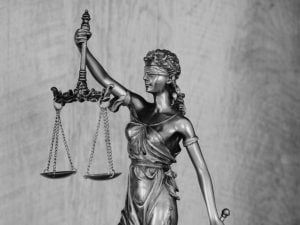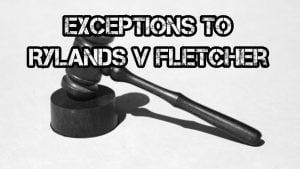Exceptions to Strict Liability in Law: Strict liability is the imposition of liability on a person without finding of fault. It arises in situations where fault is considered to be irrelevant to the question of liability. This means that the defendant will be liable for his act, irrespective of any fault on his part.
Under strict liability, there are two major liabilities: Liability under the rule in Ryland’s v Fletcher, and Liability for dangerous animals.

RECOMMENDED: How to answer law problem questions using IRAC Method
The rule of Strict Liability
The rule states that any person who, in the course of a non-natural use of his land accumulates thereon, for his own purpose, anything likely to do mischief if it escapes, is liable for all the direct damage or interference with the use of the land of another, which results from the escape of the thing from his land.
In the case of Ryland v Fletcher, the defendant a Millowner employed independent contractors to construct a reservoir on his land to provide water for his mill. While carrying out the work, the independent contractors discovered some old shafts and passages under the land, while digging at the site of the reservoir, which connected the defendants land with the Plaintiff’s land.
They negligently did not block them up because the shafts appeared to be filled with earth and blocked. When the reservoir was completed and filled with water, it burst and the water escaped through the old shafts and flooded the mine of the plaintiff.
The court per Blackburn J held that “We think that the true rule of law is that the person who, for his own purposes, brings on his land and collects and keeps there anything likely to do mischief if it escapes, must keep it at his peril, and if he does not do so, is prima facie answerable for all the damage which is the natural consequence of its escape.
Under this rule, things likely to do mischief upon escape isn’t limited to dangerous things like explosives, gas, et cetera, but also includes safe things like water, sewage which when accumulated in large quantities can become dangerous. For example, in the case of Oladehin v Continental Textile Mills Ltd, industrial water waste accumulated by the defendant escaped from its factory premises into the uncompleted house of the plaintiff thereby flooding it.
It was found that the factory was in the habit of storing large quantities of water on the premises in order to facilitate its job, and the defendant was held liable under this rule.

Recommended: Major theories of punishment in criminal law
For one to be held liable under the rule of strict liability:
1. The defendant must be an occupier of the land or an owner who controls things on the land;
2. The defendant must bring, collect or keep on his land something which is dangerous in the sense of being likely to do mischief if it escaped;
3. There must be actual escape from the defendant’s land to the plaintiff’s land
4. There must be a non-natural use of the land; and
5. There must be damage resulting from the escape.
Recommended: Salary of lawyers in India 2021
Liability Under Scienter Action (Liability For Dangerous Animals)
Section 287(1) of the Anambra State (Nigeria) provides that any person who keeps an animal of a dangerous class does so at his peril and shall be liable for any damage done by it. It therefore flows that strict liability is imposed on the person who keeps a dangerous animal which causes damage to another, whether or not the owner of the animal had prior knowledge of the animal’s conduct.
Recommended: Top most equipped universities to attend in Nigeria
Exceptions to strict liability

1. Statutory Authority: A statute may exempt public authorities from liability so long as they have taken reasonable care. Public authorities in this instance includes authorities charged with storing water, gas, electricity, disposal of sewage, et cetera. For example in the case of Green v Chelsea Waterworks Co, the defendants were authorized by the parliament to lay a water pipe which burst without negligence on the part of the defendants, and flooded the plaintiff’s premises.
The defendants were held not liable since they were under a statutory duty to maintain a continuous supply of water through the pipes and it was inevitable that there must be occasional bursts that would cause damage. So therefore, the statute exempted them from liability because there was no negligence on their part.
2. Consent of the plaintiff: It is said that Volenti non fit injuria, meaning that a person who willingly puts himself in a dangerous situation cannot sue for any resulting injuries. Thus, where the plaintiff has expressly or impliedly consented or permitted the defendant to accumulate such thing, he cannot complain if such thing escapes and causes damage to him.
For example, in Kiddle v City business properties ltd, water from the sloppy roof above the plaintiff’s shop escaped from the gutter above his shop and the gutter channeled the water to the plaintiff’s premises. The Plaintiff’s stock was damaged due to this. The court held that the Plaintiff gave an implied consent as he accepted the lease of the building as it was, with the shop as part of the building and the overhanging gutter as it was. Thus, he had consented to the damage and had no right to complain.
Also in Carstairs v Taylor the plaintiff occupied the ground floor of a building, and the top was occupied by the defendant. Rainwater from the roof was collected in a specially constructed box from which it was discharged into the drains. A Rat gnawed a hole in the box and water drained into the plaintiff’s premises and damaged his goods. The defendant was not held liable.
RECOMMENDED: Meaning and functions of the arms of government.
3. Act of a third party: Where there is a deliberate act of a third party or stranger, the rule of strict liability won’t apply. In Shell development co ltd v Otoko, there was an oil spillage from the defendant’s pipeline which polluted the plaintiff’s properties, shrines, drinking waters, and killing fishes and other living creatures.
The defendants were sued, but raised a defence of an act of a third party caused the escape of the oil. The Court of Appeal held that the rule in Ryland v Fletcher could not make the defendant liable as the defence of an act of a third party was substantiated.
Additionally, in the case of Perry v Kendricks transport ltd, the owner of a vehicle was not liable for the damage caused by the act of a child who threw a lighted match into the petrol tank of the defendant, causing it to explode and injuring the plaintiff in the process.
4. Default by the Plaintiff: The rule of strict liability is inapplicable where the damage is caused entirely or partially by the act or default of the plaintiff. For example, in the case of Ponting v Noakes the plaintiff‘s horse died after reaching across the defendant’s fence and eating from some poisonous tree there. It was held that the plaintiff could not recover anything as the damage was due to the horse’s own intrusion.
Recommended: How to write an affidavit with free Sample
5. Act of God: An act of God refers to a situation caused by natural forces beyond human anticipation, comprehension, or avoidance. Where such occur, a person will be exempted from liability. For example in Nichols v Marsland the defendant created some artificial ornamental pools on his land which contained large quantities of water. These pools were formed by damming up with artificial banks, a natural stream which flowed through his property.
He was not held liable and succeeded on the defence of act of God when an extraordinary rainfall greater and more violent than any within the memory of witnesses caused the artificial embankments to collapse and the rush of the escaping water destroyed and carried away four nearby bridges. The defendant was not negligent and could not be held liable for an extraordinary act of nature which could not have been reasonably anticipated.
Recommended: How to become a successful lawyer: 8 essential qualities
Trust this article perfectly explains the exceptions to Strict Liability? If yes, kindly share and comment below.

Edeh Samuel Chukwuemeka, ACMC, is a lawyer and a certified mediator/conciliator in Nigeria. He is also a developer with knowledge in various programming languages. Samuel is determined to leverage his skills in technology, SEO, and legal practice to revolutionize the legal profession worldwide by creating web and mobile applications that simplify legal research. Sam is also passionate about educating and providing valuable information to people.